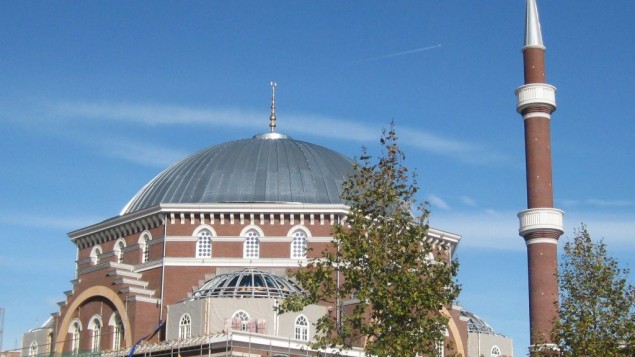I have already blogged about the despicable reactions in the Arab and Muslim world to the fires here in Israel. And here’s another one – palestinians celebrating, despite the fires posing a danger also to them (and causing destruction to the land they supposedly love)
https://www.facebook.com/ynetenglish/videos/1347445145289965/
This video is from Ynet, who also report:
“They tried to ban the muezzin’s call, and Allah rained fire on them,” Hamas official Izzat al-Risheq tweeted.
And this is where this post will take a different direction.
Despite the claims of so many in the Arab and Muslim world (and others who just hate Israel), Israel is merely seeking to ban the use of loudspeakers by mosques and other houses of worship, to prevent people’s sleep being disturbed.
 Using the Hamas-hole’s logic, “Allah” should rain fire on many places around the world, including:
Using the Hamas-hole’s logic, “Allah” should rain fire on many places around the world, including:
Each year the Moroccan Ministry of Endowments and Islamic Affairs,the body in charge of all the mosques, receives hundreds of complaints about the noise level. According to residents in Fez, for example, the problem is that the proximity of the mosques means that there is a confusion of sound and that some mosques may be boosting the sound level to be heard above other nearby mosques.
The problem is not just in Fez. The latest statistics provided by the Ministry of Endowments and Islamic Affairs shows that there are around 48,000 mosques in Morocco – 13,000 in cities and 35,000 in villages. This means that every 5,000 people are served by seven mosques.
And now an “unholy row” has broken out over the use of microphones.
In a recent interview with Al Arabiya, Moroccan researcher on Islamist movements, Saeed Lakhal, called upon the government to ban the use of microphones in mosques on the grounds that they disturb residents in the neighboring areas not only because of the sound, but also owing to the ideas they spread.
Five times a day throughout Cairo, a group of mosque employees unplug small black boxes. Depending on who you ask, they are either breaking the law or resisting an unfair government imposition.
These muezzin — men who recite the call to prayer — are fighting an effort by the Endowments Ministry to unify Cairo’s call to prayer, forcing every mosque to accept a centralized radio signal and each muezzin to stop reciting a ritual that has been repeated for generations.
The ministry hopes that a unified call will reduce Cairo’s infamous cacophony..
In a recent conversation it was brought to my attention that a certain residential community in Dubai may have taken to silencing the Muslim call to prayer in deference to tenants’ complaints.
I was told that most non-Muslim (and even some non-practicing Muslims) residents had petitioned for the action, deeming the Adhaan a ‘nuisance,’ ‘public disturbance,’ and even going so far as to categorize it under ‘noise pollution.’
A staff member works on the sound system at the Cut Meutia Mosque in Central Jakarta, Wednesday. Mosques in Jakarta have turned down the volume of their loudspeakers, especially during the month of Ramadhan, to minimize the noise they make in the city of more than 10 million people.(JP/Awo)
Until last year, Cahyo Sukaryo, 40, a Muslim resident of Kramat Jati, East Jakarta, was often irritated by mosques in his neighborhood abusing their loudspeakers, particularly during Ramadhan.
‘Some mosques used loudspeakers to wake up the neighborhood for sahur [pre-dawn meals] starting at 2 a.m.,’ he said recently.
And that was not the worst of it.
‘The mosque caretakers even called out all of our names one by one. For example, ‘Mrs. A, wake up and please prepare a good meal for sahur because your husband complained the other day!’ That’s really inappropriate and unnecessary,’ Cahyo said.
However, he realized that something had changed this year.
‘It feels quieter and they don’t do it anymore. Some of my neighbors and I had filed complaints in previous years. I think they decided to tone it down as per JK’s remarks, calling on mosques to limit loudspeaker use especially during Ramadhan,’ he said, referring to Vice President Jusuf Kalla.
At a recent national Fatwa Commission meeting of the Indonesia Ulema Council in Tegal, Central Java, Kalla, who is also the chairman of the Indonesian Mosque Council (DMI), criticized the overuse of mosque loudspeakers during Ramadhan, saying that Muslims should also respect those who need to rest at night.
He also criticized mosque caretakers who often play recordings of Koran recitations an hour prior to the adzan (call to prayer), saying that it was unnecessary.
The city of Amsterdam rejected a request by the Wester Mosque in Amsterdam-West to amplify the Muslim call to prayer from its 42-meter-high (138-foot) minaret.
When the mosque was initially constructed, its leaders agreed that the call to prayer would not be amplified from its minaret, according to local media reports. But when Amsterdam Mayor Eberhard van der Laan visited the mosque last week, congregants requested that the call be projected from loudspeakers. The mayor rejected the request immediately.
The debate over the Muslim call to prayer is reverberating once again.
At last week’s city council meeting, several residents of the Hamtramck Senior Plaza apartments on Holbrook complained about the volume level of the call to prayer coming from the Ideal Islamic Center, located across from the apartment complex.
Jeanette Powell said she’s not complaining as a way to “bash anyone’s religion.”
She said the call or prayer was broadcast at 6 a.m. and found the volume “overbearing.”
“Just turn it down a little bit.”
Do not be fooled by the haters. What Israel is attempting to do is reasonable and something many other countries – even Muslim ones – have tried to deal with.



